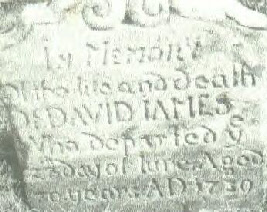
James Family Archives
• Researching the Past
• Education for the Present
• Preservation for the Future
In 1687 the Welsh Tract was still without a “formal government” and politics back in England kept everybody’s attention on the ferment that was leading up to the English Revolution of 1688 that would result in the overthrow of King James, II. During this time Penn’s land commissioners were free to conduct their business unfettered by any form of governing oversight. It was in May of 1687 that Penn’s land commissioners decided to “cut” three hundred and fifty acres from Radnor Township in Chester County in order to partially satisfy four warrants, or “promises” for land amounting to five hundred and fifty acres owed by William Penn through his land commissioners to David Meredith. These warrants or promises had been dated March 19, 1683 and May 17, 1687. Tragically, the 350 acres “cut” by Penn’s Land Commissioners from Radnor Township included both the 100 acres settled by David James in 1682 and the approximate 100 acres of lowlands that were originally included with the lands purchased by David James in 1682. Thus David James was legally disenfranchised from the lands he occupied through the land commissioners policy of “best use.” And because of the anarchic state of affairs in Pennsylvania at the time, there was no viable legal recourse for David to pursue. Nevertheless, David James remained on his lands and did not abandon them despite the scheming of Penn’s land commissioners.
Despite these unfortunate turn of events, 1687 was not a wholly dark year for the James family. On October 21, 1687 David James’ sister Margaret James who was married to Samuel Miles gave birth to their first-born daughter, Thamer James Miles, who was reported to be the first white child born in Radnor Township. Thamer’s birth seemed to herald a change in the wind, for the next year saw tectonic movements both in England and in the Quaker community in Pennsylvania that would usher in significant change in the years to come.
In 1688 England was in chaos with the English Revolution. King James, II was overthrown and voices within the Quaker community in Pennsylvania began speaking out concerning the corruption and unjust practices of those Quakers who had dominated governance and the Land Commission left by Penn to manage the Welsh Tract. One such voice was George Keith who, in 1688, published an article entitled “Gospel Order Improved,” also referred to as “Gospel Order and Discipline” in later editions, which spoke of potential reforms to the American Quaker church. Keith’s article emphasized a formal testimony of their experiences of God, and the recital of a creed to solidify their agreement with Quaker beliefs. Keith spoke of how the Quaker church in America had become infiltrated by false believers and deceivers, who “crept into ye form & profession of Friends’ way, who are not really friends of Truth.” Keith was a firebrand and put to words the discontent of the Quaker community who saw the ruling Quakers becoming every bit as corrupt as those whom they had left in Wales. Keith would have a profound impact on David James as well as the families of Samuel and Richard Miles.
In 1689 William Penn made his first significant attempt to collect his “quit rent” from the residents of the Welsh Tract barony. Although he was not present, he sent a man by the name of John Blackwell to begin collecting these funds from the residents of Pennsylvania. This effort would come to be known as “The Blackwell Rent Roll of 1689.” In this year David James was required to pay 10 shillings of “quitrent” to William Penn for his two city lots located along Chestnut Street between 5th and 6th Streets. These lots were adjacent to the lots owned by his brother-in-law Samuel Miles and good friend William Davis. All three of these men were identified as “original purchasers” as of 1684 with 49 feet each of street frontage per lot. Samuel Miles was charged retroactively 1 shilling per annum for five years of ownership of his lot. David James was charged retroactively 2 shillings per annum for five years of ownership of his two lots. And William Davis was charged retroactively 1 shilling per annum for five years of ownership of his lot.